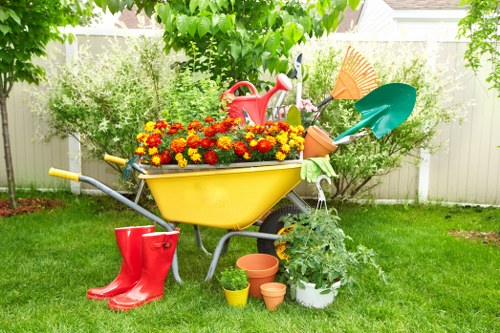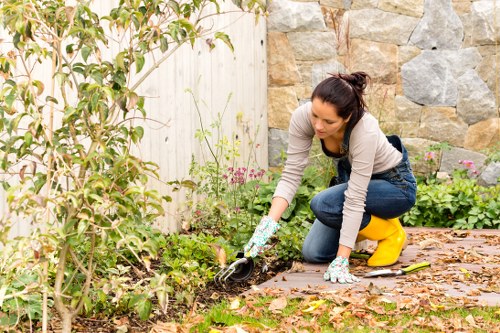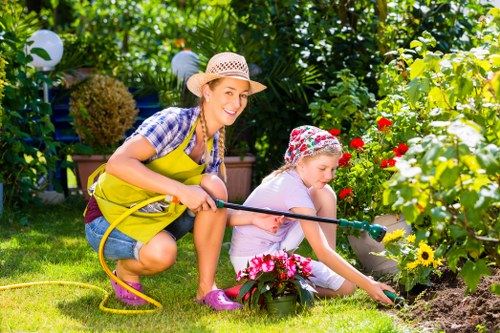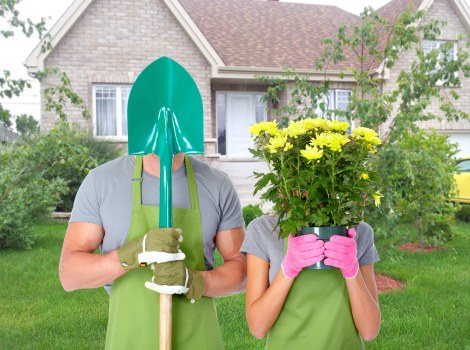Comprehensive Garden Maintenance in West Ham

Introduction to Garden Maintenance
Maintaining a beautiful garden in West Ham requires dedication, knowledge, and the right resources. Whether you're a seasoned gardener or a novice, understanding the essentials of garden upkeep can transform your outdoor space into a thriving haven.
West Ham’s unique climate and soil conditions offer both opportunities and challenges for gardeners. Proper maintenance not only enhances the aesthetic appeal of your garden but also ensures the health and longevity of your plants.
In this article, we'll explore the key aspects of garden maintenance in West Ham, providing you with practical tips and strategies to keep your garden lush and vibrant throughout the year.

Seasonal Garden Care
Spring Maintenance
Spring is the perfect time to rejuvenate your garden. Start by cleaning up any debris from the winter months, such as fallen leaves and dead plants. This cleanup encourages new growth and prevents pests from settling in.
Planting spring bulbs like tulips and daffodils can add color and depth to your garden. Additionally, pruning shrubs and trees ensures they maintain their shape and promotes healthy growth.
Don't forget to prepare your soil by adding compost or organic matter. This enriches the soil, providing essential nutrients for your plants to thrive.

Summer Maintenance
Summer in West Ham can be hot and dry, making watering crucial. Implementing an efficient irrigation system, such as drip irrigation, can help conserve water while ensuring your plants receive adequate moisture.
Regular weeding is essential during the summer months. Weeds compete with your garden plants for nutrients and water, so keeping them in check helps your garden flourish.
Mulching around plants helps retain soil moisture, regulate temperature, and suppress weed growth. Organic mulches like wood chips or straw are excellent choices.

Autumn Maintenance
Autumn is a time for preparing your garden for the colder months. Start by harvesting any remaining produce and clearing out spent annuals to make way for new plants.
Pruning perennials encourages robust growth in the spring. It's also a good time to divide and transplant overcrowded plants, ensuring they have enough space to thrive.
Leaf fall provides an excellent source of natural mulch. Raking leaves and spreading them around your plants protect the roots from frost and add organic matter to the soil.

Winter Maintenance
While winter can be dormant for many plants, it's still important to maintain your garden. Protect sensitive plants with mulch or by covering them with frost cloths to prevent damage from freezing temperatures.
Use this time to plan for the upcoming gardening season. Research new plants, design garden layouts, and order seeds or bulbs to ensure a productive spring.
Regularly check for any signs of diseases or pests, even during the colder months. Early detection can prevent more significant issues in the future.
Essential Garden Tools

Basic Tools Every Gardener Needs
- Gloves: Protect your hands from thorns, dirt, and potential allergens.
- Pruners: Essential for trimming and shaping plants.
- Garden Fork: Great for turning soil and aerating garden beds.
- Watering Can or Hose: Ensure your plants receive adequate moisture.
- Spade: Ideal for digging and planting.
Investing in high-quality tools can make garden maintenance tasks easier and more efficient, ultimately leading to a healthier and more attractive garden.
Regularly clean and store your tools properly to extend their lifespan and ensure they're ready for use when needed.

Soil Management
Understanding Your Soil
Healthy soil is the foundation of a thriving garden. Conduct a soil test to determine its pH level and nutrient content. This information helps you understand what amendments are necessary to optimize plant growth.
West Ham’s soil may vary, so knowing its composition allows you to tailor your gardening practices accordingly. Whether it's clay, sandy, or loamy soil, each type has unique characteristics that affect drainage and nutrient availability.
Amending your soil with organic matter like compost improves its structure, enhances fertility, and promotes beneficial microbial activity.

Composting
Composting is an eco-friendly way to recycle garden waste and kitchen scraps into valuable fertilizer. A well-maintained compost pile provides a steady supply of nutrients, improving soil health and reducing the need for chemical fertilizers.
To create an effective compost, balance green materials (like grass clippings and vegetable scraps) with brown materials (such as dried leaves and straw). Regularly turning the pile ensures proper aeration and accelerates decomposition.
Use finished compost to enrich garden beds, improve soil texture, and support plant growth.

Mulching Techniques
Mulching plays a vital role in garden maintenance by conserving moisture, regulating soil temperature, and suppressing weed growth. Organic mulches like bark, compost, and straw not only provide these benefits but also break down over time, enriching the soil.
Apply a 2-3 inch layer of mulch around your plants, taking care to leave space around stems and trunks to prevent rot and disease.
Incorporate mulch into your seasonal maintenance routine to maintain a healthy and aesthetically pleasing garden.

Pest and Disease Management
Identifying Common Pests
Pests can quickly derail your garden efforts. Common pests in West Ham include aphids, slugs, and caterpillars. Regularly inspect your plants for signs of infestation, such as chewed leaves or discolored foliage.
Implementing integrated pest management (IPM) strategies can effectively control pest populations. This includes introducing beneficial insects, using physical barriers, and applying organic pesticides when necessary.
Maintaining plant health through proper watering and fertilization can also make your garden more resilient against pests.

Preventing Plant Diseases
Plant diseases can spread rapidly, especially in moist conditions. Practices such as crop rotation, selecting disease-resistant varieties, and ensuring adequate air circulation can help prevent outbreaks.
Remove and dispose of any diseased plant material promptly to reduce the risk of contamination.
Regularly fertilizing and watering your plants appropriately supports their immune systems, making them less susceptible to diseases.

Pruning and Trimming
Why Pruning is Important
Pruning is essential for maintaining the shape and health of your plants. It encourages new growth, removes dead or diseased branches, and improves air circulation within the canopy.
Different plants require different pruning techniques. For instance, flowering shrubs may need to be pruned immediately after blooming to ensure a good display the following year.
Regular pruning helps prevent overgrowth, which can lead to structural issues and increased vulnerability to pests and diseases.

Techniques for Effective Trimming
Use sharp, clean tools to make precise cuts that heal quickly. Avoid tearing the bark or leaving jagged edges, which can become entry points for pathogens.
Focus on removing crossing branches and thinning out dense areas to enhance light penetration and airflow.
For hedges, trim them in the early morning or late afternoon to reduce stress on the plants during cooler parts of the day.

Seasonal Pruning Schedule
Establishing a seasonal pruning schedule ensures that your plants receive the appropriate care at the right times. For example, deciduous trees are best pruned during their dormant winter period, while evergreen shrubs can be maintained throughout the growing season.
Regularly monitoring the growth patterns of your plants helps you determine the optimal times for pruning and trimming.
Consistent pruning promotes healthier, more robust plants and enhances the overall appearance of your garden.

Watering Strategies
Efficient Irrigation Systems
Implementing efficient watering systems is crucial for garden maintenance, especially during the hot summer months. Drip irrigation and soaker hoses deliver water directly to the plant roots, minimizing evaporation and waste.
Setting up a scheduled watering routine ensures your plants receive consistent moisture without overwatering, which can lead to root rot and other issues.
Consider using rain barrels to collect and store rainwater, providing an eco-friendly and cost-effective water source for your garden.

Watering Techniques
Water your plants in the early morning or late evening to reduce water loss due to evaporation. This timing also allows plants to absorb moisture before the heat of the day.
Avoid overhead watering, which can promote fungal diseases. Instead, focus on the base of the plants where the roots are located.
Adjust your watering schedule based on seasonal changes and the specific needs of different plants to ensure optimal hydration.

Fertilization Practices
Choosing the Right Fertilizer
Selecting the appropriate fertilizer is vital for providing your plants with the necessary nutrients. Organic fertilizers, such as compost and manure, improve soil health and support beneficial microorganisms.
For specific nutrient deficiencies, consider using targeted fertilizers that address particular needs. For example, nitrogen-rich fertilizers promote leafy growth, while phosphorus aids in root development and flowering.
Always follow the recommended application rates to prevent over-fertilization, which can harm plants and pollute the environment.

Application Techniques
Apply fertilizers evenly around the base of your plants, ensuring that the nutrients reach the root zone where they are most effective.
Avoid fertilizing during extreme weather conditions, such as heatwaves or heavy rainfall, to prevent nutrient runoff and plant stress.
Incorporate mulch after fertilizing to help retain moisture and further enhance soil fertility.

Natural Fertilization Methods
Promote sustainable gardening practices by using natural fertilization methods. Composting, as previously discussed, is an excellent way to recycle organic waste into valuable soil amendments.
Green manures, such as clover or rye, can be grown and tilled into the soil to add nitrogen and improve soil structure.
Using cover crops helps prevent soil erosion, suppress weeds, and enhance overall soil health.

Landscape Design and Planning
Creating a Balanced Layout
A well-designed garden layout balances aesthetics with functionality. Consider the scale of your garden, the types of plants you wish to include, and how different elements will interact.
Incorporate focal points, such as a water feature or a colorful flower bed, to add visual interest and guide the eye through the space.
Ensure there is a harmonious blend of textures, colors, and plant heights to create a dynamic and pleasing environment.

Plant Selection and Diversity
Choosing a diverse range of plants enhances the resilience of your garden against pests and diseases. Select native or well-adapted species that thrive in West Ham’s climate.
Incorporate a mix of perennials and annuals to ensure continuous blooms and interest throughout the growing season.
Consider the specific needs of each plant, including sunlight, water, and soil requirements, to ensure they flourish in their designated areas.

Sustainable Gardening Practices
Adopting sustainable gardening practices benefits both your garden and the environment. Implementing water-saving techniques, reducing chemical use, and promoting biodiversity contribute to a healthier ecosystem.
Encourage pollinators by planting nectar-rich flowers and providing habitats for beneficial insects.
Use recycled materials for garden structures and pathways to minimize waste and promote eco-friendly landscaping.

Maintaining Garden Health
Regular Inspections
Conducting regular inspections of your garden helps catch issues early. Look for signs of pests, diseases, or nutrient deficiencies and address them promptly to prevent widespread problems.
Monitoring plant growth and health allows you to make informed decisions about watering, fertilizing, and pruning.
Keep a gardening journal to track observations, treatments, and seasonal changes, helping you refine your maintenance strategies over time.

Soil Health Monitoring
Healthy soil supports robust plant growth. Regularly test your soil's pH and nutrient levels to ensure it remains conducive to your plants' needs.
Amend the soil as necessary based on test results, using organic or mineral-based fertilizers to correct deficiencies.
Maintain soil structure by avoiding compaction and promoting aeration through practices like mulching and the use of organic matter.

Integrated Garden Care
Integrated garden care combines various maintenance practices to create a holistic approach to gardening. This includes proper watering, fertilization, pest management, and pruning, all working together to maintain garden health.
By addressing all aspects of garden maintenance, you ensure your garden remains vibrant, resilient, and beautiful throughout the year.
Consistency and attention to detail are key to successful integrated garden care.

Enhancing Garden Aesthetics
Adding Decorative Elements
Incorporating decorative elements like garden statues, trellises, and decorative pots can elevate the visual appeal of your garden. These additions add personality and charm, making your garden a more enjoyable space.
Choose decorations that complement your garden's theme and color palette to maintain a cohesive look.
Strategically placing elements can also create focal points and enhance the overall design of your outdoor space.

Lighting for Nighttime Beauty
Garden lighting extends the enjoyment of your garden into the evening hours. Install pathway lights, spotlights, and string lights to highlight key features and create a welcoming atmosphere.
Solar-powered lights are an eco-friendly option that reduces energy consumption while providing adequate illumination.
Proper lighting enhances safety by illuminating walkways and entrances, preventing accidents and deterring intruders.

Creating Garden Pathways
Pathways guide visitors through your garden and define different areas. Materials like gravel, stone, or brick offer durability and aesthetic appeal.
Design winding paths to add interest and encourage exploration, while straight paths provide a formal and structured feel.
Ensure pathways are wide enough for easy navigation and consider integrating lighting for added functionality and beauty.

Maintaining Garden Structures
Fencing and Boundaries
Fences and boundaries not only define your garden space but also provide security and privacy. Regularly inspect and maintain these structures to ensure they remain sturdy and functional.
Repair any damages promptly and consider applying protective coatings to prevent weathering and extend their lifespan.
Choose fencing materials and styles that complement your garden's overall design and enhance its aesthetic appeal.

Garden Furniture and Fixtures
Garden furniture and fixtures create functional areas for relaxation and entertainment. Choose durable, weather-resistant materials to withstand West Ham's climate.
Arrange furniture to promote social interaction and enjoyment of your garden’s features, such as views, plantings, and decorative elements.
Regularly clean and maintain furniture to keep it in good condition and extend its usability.

Eco-Friendly Gardening Practices
Water Conservation
Implementing water conservation techniques is essential for sustainable garden maintenance. Use mulching, efficient irrigation systems, and drought-resistant plants to minimize water usage.
Collecting and reusing rainwater reduces reliance on municipal water sources and helps maintain garden hydration during dry periods.
Regularly monitoring soil moisture levels ensures that plants receive the right amount of water without waste.

Organic Gardening
Organic gardening focuses on natural methods to support plant health and soil fertility. Avoid synthetic chemicals, opting instead for organic fertilizers, pest control, and composting.
Encouraging biodiversity by planting a variety of species attracts beneficial insects and promotes a balanced ecosystem.
Adopting organic practices enhances the sustainability of your garden and contributes to a healthier environment.

Reducing Carbon Footprint
Gardening can positively impact your carbon footprint. Planting trees and shrubs sequesters carbon dioxide, while composting reduces landfill waste and methane emissions.
Choosing locally sourced plants and materials minimizes transportation emissions, supporting a more sustainable garden.
Integrate energy-efficient practices, such as solar-powered garden lights, to further reduce your garden’s environmental impact.

Professional Garden Maintenance Services
Benefits of Hiring Professionals
While DIY garden maintenance is rewarding, hiring professional services in West Ham offers numerous advantages. Professionals have the expertise and equipment to handle complex tasks efficiently.
They provide tailored maintenance plans that address the specific needs of your garden, ensuring optimal health and beauty.
Outsourcing maintenance frees up your time, allowing you to enjoy your garden without the stress of upkeep.

Choosing the Right Service Provider
Select a reputable garden maintenance service with a proven track record in West Ham. Look for providers that offer comprehensive services, including pruning, fertilizing, pest control, and landscaping.
Check reviews, request references, and ensure they are licensed and insured to protect your property and investment.
Discuss your garden goals and preferences to ensure the service provider aligns with your vision and can deliver the desired results.

DIY Garden Maintenance Tips
Planning and Scheduling
Effective garden maintenance starts with careful planning and scheduling. Create a maintenance calendar that outlines tasks such as planting, pruning, fertilizing, and weeding throughout the year.
Prioritize tasks based on seasonal requirements and plant needs to ensure timely and efficient care.
Regularly review and adjust your schedule to accommodate changes in weather, plant growth, and personal availability.

Resource Management
Managing resources effectively is key to successful garden maintenance. This includes water, fertilizers, tools, and compost.
Store resources in an organized manner, making them easily accessible when needed and reducing waste.
Utilize resources sparingly and responsibly, ensuring sustainability and cost-effectiveness in your gardening practices.
Book your service now to transform your West Ham garden into a lush, vibrant space.

